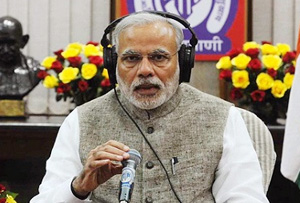New Delhi, Jun 28: Prime Minister Narendra Modi today spoke about a number of social issues in his monthly radio address but chose to avoid any reference to the political storm that has been generated by Lalit Modi issue for which Congress warned him that the issue will continue to "haunt" him.
CPI and AAP also attacked Modi for remaining silent on the controversy. In his 'Mann Ki Baat' programme on radio, Modi refrained from speaking on politics or the recent controversies surrounding Rajasthan Chief Minister Vasundhara Raje and External Affairs Minister Sushma Swaraj over the Lalit Modi issue which some quarters were expecting.
Among various topics, he talked about the girl child, voicing concern over the depleting sex ratio in 100 districts of the country, with the situation being more serious in Haryana. He pitched for a mass campaign to save the girl child.
During the 20-minute programme, he also spoke about the recently-launched three social security schemes and three developmental schemes, including 'housing for all' by 2022, as well as the Yoga Day celebrated on June 21. He also emphasised on the need for saving water and planting trees to preserve the environment.
Speaking soon after the 'Man ki Baat' programme was aired, Congress leader Ghulam Nabi Azad expressed disappointment over the "failure" of the Prime Minister to speak on Lalit Modi controversy.
His other senior party colleagues P Chidambaram and Digvijay Singh as also CPI's D Raja and AAP leader Ashish Khetan.
"All over India, no one is ready to listen to 'Mann Ki Baat....Everyone wants to listen to voice of people in the programme," said Azad, Leader of Opposition in Rajya Sabha.
Taking a dig at Modi, Azad said he continued to be a "dream merchant" in the programme as he has been merely selling dreams in India and abroad.
"It is in the interest of the Prime Minister to take immediate action against those involved in corruption. Otherwise nationally and internationally, it is going to haunt him wherever he goes," he told reporters.
In Pudukottai in Tamil Nadu, Chidambaram also questioned Modi's silence on recent controversies.
"The Prime Minister, who criticised Manmohan Singh for being silent, is silent now...," he said at a meeting while referring to the controversy surrounding Raje for her links with Lalit Modi, former IPL Commissioner.
Attacking the Prime Minister for being silent on 'Lalitgate' and other controversies, Congress General Secretary Digvijay Singh alleged that he was helping the former IPL chief in getting him bailed out of ED cases against him.
"Every Sunday he (Narendra Modi) talks about 'Mann ki Baat', but doesn't answer the basic questions which have emerged over the past fortnight ever since the Lalit Modi controversy came up. My charge is that Narendra Modi is helping Lalit Modi. My charge is that he has promised Lalit Modi that he will be bailed out of all the cases in which he is being investigated by Enforcement Directorate (ED)," Singh alleged while talking to reporters in Hyderabad.
"Let Narendra Modi come out clean on this. They (BJP) talk of morality ad accountability, but when it comes to morality and accountability to be practised by the BJP, they said that what we say is absolute truth," he said.
CPI leader D Raja also criticised Narendra Modi. "In 'Mann Ki Baat', he (Prime Minister) spoke on several other issues but he has not uttered a single word on the Latit Modi issue. He has not said anything on Raje. Why is he keeping silent? The situation is getting murkier.... Who is he protecting? Mr Modi is trying to shield certain things or protect some individuals? Why this silence? This is an issue."
AAP leader Ashish Ketan said, "The whole country has only one 'Mann Ki Baat' which is what is the Prime Minister's take on the issue of 'Lalitgate', Sushma Swaraj and Vasundhra Raje. And that Mann Ki Baat remained unaddressed."
BJP spokesman Sambit Patra hit out at Congress for criticising the Prime Minister, saying Modi has spoken on issues of pertinence, like protection of girl child, social security and water conservation. "There are far more issues than satisfying the frustration of the Congress," he said.





Comments
Add new comment